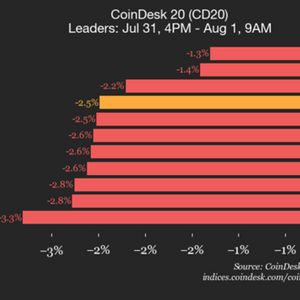Solana ETF: Invesco & Galaxy Digital’s Revolutionary Bid for Crypto Mainstream
9 min read
BitcoinWorld Solana ETF: Invesco & Galaxy Digital’s Revolutionary Bid for Crypto Mainstream The cryptocurrency world is buzzing with anticipation as a significant development hints at the continued convergence of traditional finance and digital assets. Global asset management powerhouse Invesco, in collaboration with digital asset specialist Galaxy Digital, has officially submitted an application for a spot Solana ETF to the U.S. Securities and Exchange Commission (SEC). This groundbreaking move, reported by Solid Intel via X, was made in conjunction with the Chicago Board Options Exchange (CBOE), signaling a serious intent to bring Solana to mainstream investment portfolios. For investors and enthusiasts alike, this development represents a pivotal moment, potentially opening new avenues for regulated access to the dynamic Solana ecosystem. The Genesis of a Solana ETF: A New Era for Digital Assets? The filing of a spot Solana ETF application marks a crucial milestone in the evolution of cryptocurrency investment products. This move follows closely on the heels of successful Bitcoin and Ethereum spot ETF approvals earlier this year, setting a powerful precedent for other major cryptocurrencies to gain similar institutional acceptance. The SEC has historically been cautious, but the changing regulatory landscape, partly influenced by landmark court decisions, has paved the way for more digital asset products. Invesco and Galaxy Digital are not newcomers to this space; their joint efforts have been instrumental in pushing for various crypto-backed financial products. Their decision to target Solana next underscores the growing recognition of Solana’s technological prowess and its burgeoning ecosystem. The involvement of the CBOE, a regulated exchange, further legitimizes the application, addressing some of the SEC’s traditional concerns regarding market oversight and surveillance. This concerted effort by established financial entities suggests a robust and well-researched approach to bringing a Solana ETF to market, potentially ushering in a new era where altcoins gain similar institutional legitimacy as Bitcoin and Ethereum. Understanding the Players: Who are Invesco and Galaxy Digital? The strength of any ETF application often lies in the credibility and expertise of the entities behind it. In this case, the partnership between Invesco and Galaxy Digital creates a formidable team, blending traditional financial acumen with deep crypto native knowledge. Invesco: As a leading global independent investment management firm with trillions of dollars in assets under management, Invesco boasts a long history of managing a diverse range of ETFs. Their expertise in product structuring, compliance, and distribution is unparalleled, lending significant weight and credibility to the Solana ETF application. Galaxy Digital: Founded by crypto pioneer Mike Novogratz, Galaxy Digital is a diversified financial services and investment management company dedicated to the digital asset sector. Their profound understanding of the crypto market’s intricacies, coupled with their extensive network within the digital asset community, makes them an ideal partner for navigating the unique challenges of a crypto ETF. This synergistic partnership has previously collaborated on Bitcoin ETF filings, demonstrating a proven track record of working together towards common goals in the digital asset space. Their combined experience offers a comprehensive approach, addressing both the traditional finance requirements and the specific nuances of the cryptocurrency market. What Exactly is a Spot Solana ETF and Why Does it Matter? To fully grasp the significance of this development, it’s essential to understand what a spot Solana ETF entails and why it’s a game-changer for investors. An Exchange-Traded Fund (ETF) is an investment fund traded on stock exchanges. A spot ETF, specifically, holds the underlying asset directly. In the case of a spot Solana ETF, the fund would directly hold actual SOL tokens, meaning its value would closely track the real-time market price of Solana. This differs from a futures ETF, which tracks the price of futures contracts. Here’s why a spot Solana ETF is so impactful: Accessibility: It allows traditional investors to gain exposure to Solana through existing brokerage accounts, eliminating the need to set up crypto exchange accounts or manage private keys. Liquidity: ETFs are highly liquid, trading throughout the day on major exchanges, providing investors with easy entry and exit points. Regulatory Oversight: Trading a Solana ETF on a regulated exchange like CBOE provides a layer of investor protection and oversight, appealing to institutional investors and those who prioritize security and compliance. Diversification: For institutional portfolios, a Solana ETF offers a regulated way to diversify into the altcoin market, potentially capturing growth beyond Bitcoin and Ethereum. In essence, a spot Solana ETF bridges the gap between the traditional financial system and the innovative world of decentralized finance, making Solana accessible to a much wider audience. Why Solana? The Network Powering the Next Wave of ETFs The choice of Solana as the next cryptocurrency for an ETF application is not arbitrary. Solana has rapidly emerged as a formidable contender in the blockchain space, often touted as a direct competitor to Ethereum due to its high performance capabilities. Its distinctive features make it particularly attractive for institutional interest: Scalability and Speed: Solana boasts impressive transaction speeds and high throughput, capable of processing tens of thousands of transactions per second (TPS) with very low transaction fees, achieved through its innovative Proof-of-History (PoH) consensus mechanism. Vibrant Ecosystem: The Solana network supports a thriving ecosystem of decentralized applications (dApps), including significant projects in Decentralized Finance (DeFi), Non-Fungible Tokens (NFTs), and gaming, demonstrating real-world utility and adoption. Developer Activity: Solana continues to attract a large and active developer community, crucial for long-term growth and innovation. While Solana has faced challenges, particularly network outages in the past, its core technology and growing adoption position it as a leading candidate for institutional products like a Solana ETF . Its market capitalization consistently places it among the top cryptocurrencies, further solidifying its standing as a major player in the digital asset landscape. Navigating the Regulatory Labyrinth: The SEC’s Stance on a Solana ETF The path to SEC approval for any crypto ETF is notoriously challenging, and a Solana ETF will face rigorous scrutiny. The SEC’s primary mandate is investor protection, and they have historically expressed concerns about market manipulation, custody risks, and the classification of digital assets. The regulatory journey for crypto ETFs has seen significant shifts. After years of resistance, the SEC finally approved several spot Bitcoin ETFs in January 2024, followed by spot Ethereum ETFs in May 2024. These approvals were largely driven by the establishment of robust surveillance-sharing agreements with regulated spot crypto exchanges, aimed at mitigating market manipulation risks. For a Solana ETF , the SEC will likely apply similar criteria. Key questions will revolve around Solana’s market size, liquidity, and whether adequate surveillance-sharing agreements can be established with exchanges where a significant portion of SOL trading occurs. The SEC will also likely assess whether Solana, like Bitcoin and Ethereum, can be considered a commodity rather than a security, a classification that significantly impacts regulatory oversight. While the precedent set by Bitcoin and Ethereum approvals is favorable, each altcoin application will still be evaluated on its own merits and market characteristics. Potential Impact: How a Solana ETF Could Reshape the Crypto Landscape The approval of a spot Solana ETF could have profound implications, not just for Solana but for the entire cryptocurrency market and its ongoing integration with traditional finance. For Solana (SOL): Increased Demand & Price Action: A regulated ETF would open the floodgates for institutional capital and retail investors who prefer traditional investment vehicles, potentially boosting SOL’s price and market capitalization. Enhanced Legitimacy: An ETF approval would grant Solana a stamp of regulatory approval, elevating its status and perception among mainstream investors and financial advisors. Greater Liquidity: As more capital flows into the market via the ETF, overall liquidity for SOL could improve, leading to more stable price discovery. For the Broader Crypto Market: Paving the Way for Other Altcoins: A Solana ETF approval would set another crucial precedent, making it easier for other prominent altcoins to pursue similar investment products. Institutional Confidence: It signals growing institutional confidence in the digital asset space beyond just Bitcoin and Ethereum, encouraging more traditional financial institutions to explore crypto-related offerings. Mainstream Adoption: As more regulated products become available, the barrier to entry for the average investor decreases, accelerating overall mainstream adoption of cryptocurrencies. The ripple effect of a Solana ETF could be transformative, signaling a maturing market ready for broader integration into global financial systems. Challenges and Hurdles: What Could Delay or Derail a Solana ETF? While the prospect of a Solana ETF is exciting, several challenges and hurdles could delay or even derail its approval. The SEC’s cautious approach is well-documented, and they will thoroughly examine every aspect of the application. Regulatory Scrutiny: Despite recent approvals, the SEC maintains a high bar for new crypto products. Concerns about market manipulation, surveillance capabilities, and investor protection remain paramount. Classification of SOL: A significant hurdle is whether SOL is deemed a security or a commodity by the SEC. If classified as a security, it would fall under a different regulatory framework, potentially complicating or preventing an ETF approval. Network Stability: Solana has faced criticisms regarding network outages in the past. While the network has significantly improved its stability, past incidents could still be a point of concern for regulators. Market Volatility: Cryptocurrencies, including Solana, are known for their extreme price volatility, which regulators may scrutinize regarding investor protection. Addressing these concerns effectively through robust surveillance, clear market data, and compelling arguments for Solana’s commodity status will be crucial for Invesco and Galaxy Digital. In conclusion, the application for a spot Solana ETF by Invesco and Galaxy Digital marks a significant stride in the institutional adoption of digital assets. Building on the precedents set by Bitcoin and Ethereum ETFs, this move signals a growing confidence in Solana’s underlying technology and its potential as a legitimate investment vehicle. While regulatory hurdles, particularly concerning market manipulation and asset classification, remain, the collaboration between seasoned financial players and a leading digital asset specialist positions this application for serious consideration. Should it gain approval, a Solana ETF could not only unlock substantial institutional capital for the SOL ecosystem but also pave the way for a broader array of altcoin-based investment products, further integrating the dynamic world of cryptocurrencies into the global financial mainstream. This development underscores the relentless march of digital assets towards broader acceptance and accessibility, promising an exciting future for investors seeking diversified exposure to the crypto market. Frequently Asked Questions (FAQs) 1. What is a spot Solana ETF? A spot Solana ETF (Exchange-Traded Fund) is an investment product that directly holds Solana (SOL) tokens. Its value tracks the real-time market price of SOL, allowing investors to gain exposure to Solana through traditional brokerage accounts without directly owning or managing the cryptocurrency. 2. Who are Invesco and Galaxy Digital? Invesco is a large global asset management firm with extensive experience in traditional finance and ETFs. Galaxy Digital, founded by Mike Novogratz, is a diversified financial services company focused on the digital asset sector. They have partnered on previous crypto ETF applications, combining traditional financial expertise with deep crypto market knowledge. 3. Why is Solana being considered for an ETF? Solana is considered for an ETF due to its high performance, scalability, low transaction fees, and a rapidly growing ecosystem of decentralized applications (dApps). Its position as a major cryptocurrency by market capitalization and increasing institutional interest in its technology make it an attractive candidate for a regulated investment product. 4. What are the main hurdles for a Solana ETF approval? The primary hurdles for a Solana ETF approval include the SEC’s concerns about market manipulation, the establishment of effective surveillance-sharing agreements with significant Solana trading platforms, and the regulatory classification of SOL as a commodity rather than a security. Network stability and market volatility are also considerations. 5. How would a Solana ETF benefit investors? A Solana ETF would benefit investors by offering easier accessibility through traditional brokerage accounts, enhanced liquidity, and the added layer of regulatory oversight and investor protection provided by trading on a regulated exchange like CBOE. It removes the complexities of direct crypto ownership, such as self-custody and managing private keys. 6. When might a decision on the Solana ETF application be expected? While there’s no fixed timeline, the SEC typically follows a structured review process for ETF applications, which can take several months, involving public comment periods and multiple decision deadlines. Given the recent approvals for Bitcoin and Ethereum ETFs, there might be a precedent for a somewhat faster review, but an exact date is not predictable. If you found this article insightful, consider sharing it with your network! Your shares help us bring more in-depth analyses of the evolving cryptocurrency landscape to a wider audience. Follow us on social media for the latest updates and discussions. To learn more about the latest crypto market trends, explore our article on key developments shaping Solana’s institutional adoption . This post Solana ETF: Invesco & Galaxy Digital’s Revolutionary Bid for Crypto Mainstream first appeared on BitcoinWorld and is written by Editorial Team

Source: Bitcoin World



